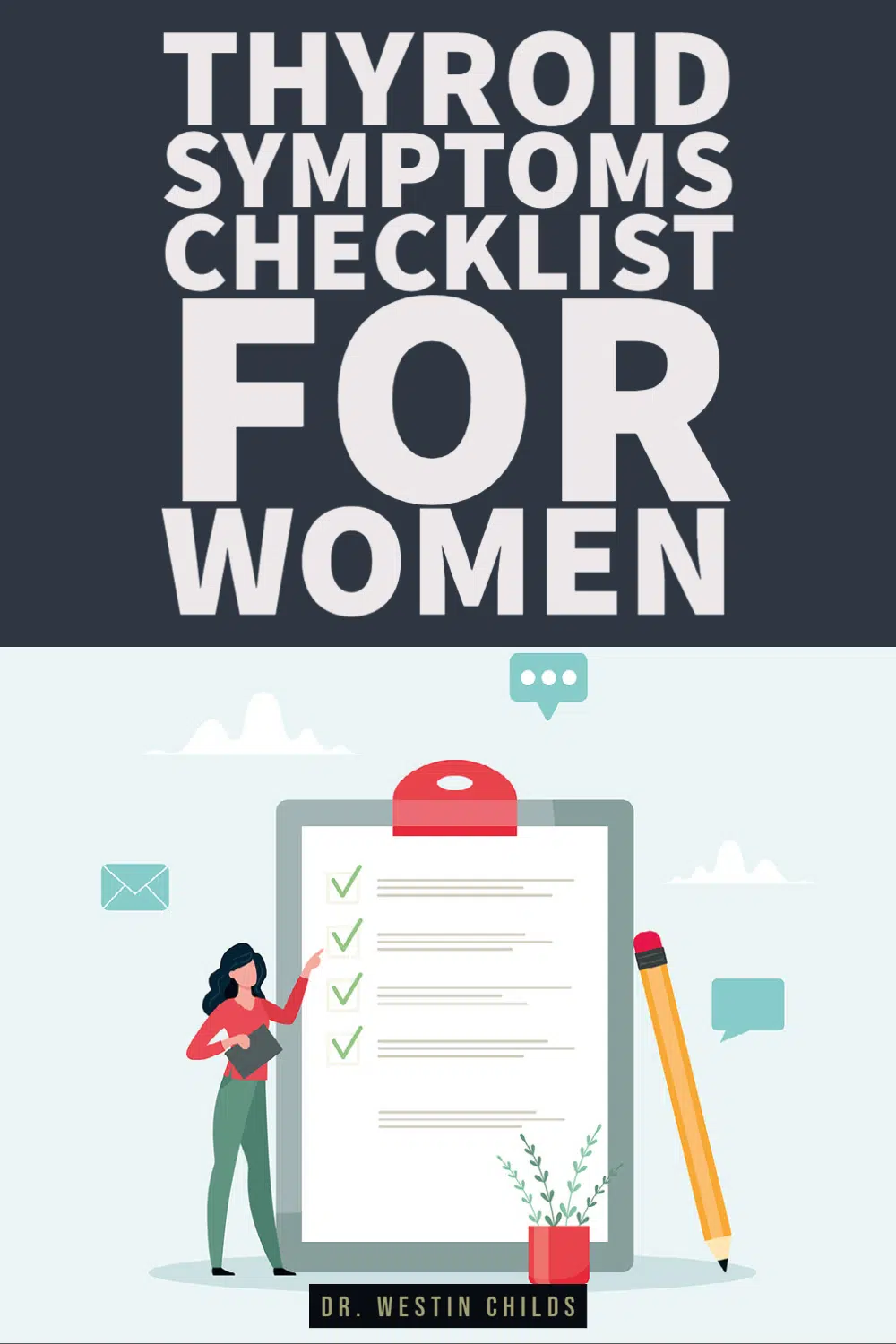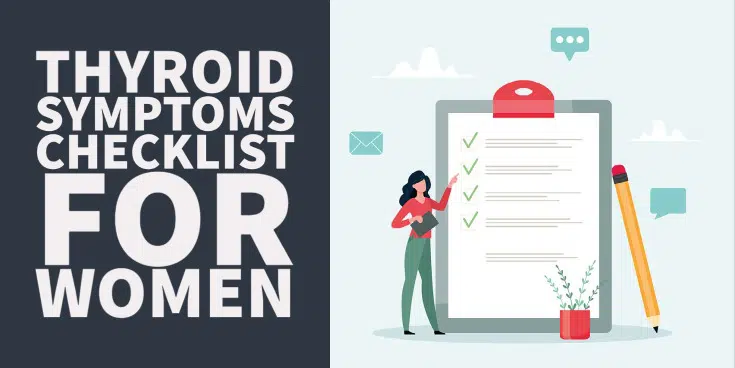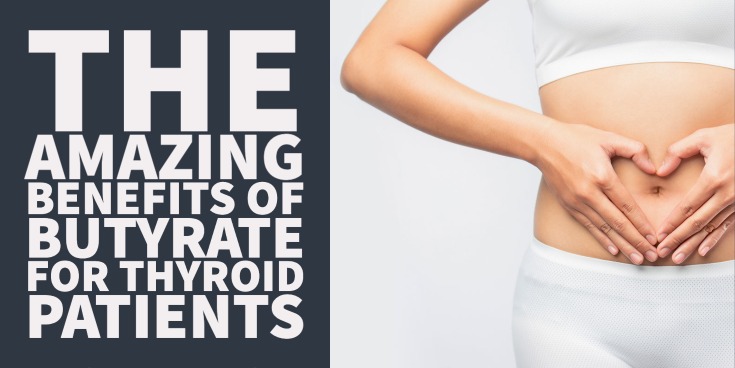Do you think that you have the symptoms of hypothyroidism?
I’m talking about symptoms such as weight gain, fatigue, menstrual irregularities, and hair loss.
All of these symptoms and more may be caused by your thyroid.
The problem?
Standard lab tests and conventional treatment don’t necessarily help alleviate the symptoms of this hormone imbalance.
Learn what to do if you think you are suffering from thyroid symptoms in women:
Do you have Thyroid Problems?
Hypothyroidism is one of the most common hormone imbalances in the United States.
It is estimated that up to 20% of people in the U.S. have either hypothyroidism or subclinical hypothyroidism (1) (more if you consider that many women are not properly diagnosed!).
This is especially true for women, who are more susceptible to developing this hormone imbalance (2) (much of this reason stems from the increased risk that women have in developing the autoimmune disease Hashimoto’s thyroiditis).
But why is this a problem?
Your thyroid controls and regulates a number of very important systems in your body.
Because of this, your thyroid may be one of the most important hormonal systems in your body.
It helps regulate your sex hormones (3).
It manages your weight and metabolism (4).
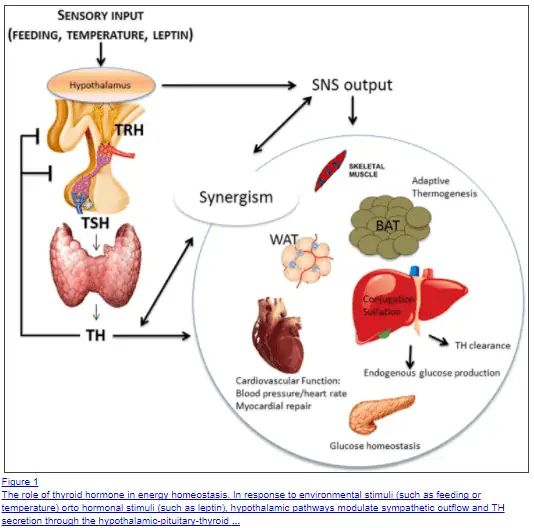
It helps produce your subjective sense of energy (5).
It helps regulate and moderate your mood (6).
If these sound important it’s because they are!
One of the big issues with hypothyroidism has to do with how it is diagnosed and how it is treated.
You’ve probably heard that many people out there believe that they have some sort of thyroid problem only to be told, after testing, that their thyroid is completely normal.
This is a very common occurrence and it has to do with how hypothyroidism is diagnosed.
Current standards for diagnosing hypothyroidism are based solely on laboratory testing and a basic algorithm (7).
Specifically the TSH or thyroid stimulating hormone.
If your TSH is high it means you are hypothyroid.
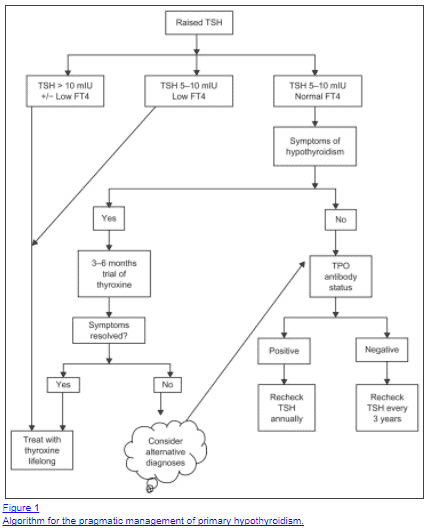
If you are hypothyroid the standard of care is to treat you with levothyroxine or Synthroid for your entire life.
I’m always suspicious when people try to simplify something as complex as human hormones into a rigid algorithm that doesn’t allow for specific patient differences…
Why then do so many people taking these medications report no improvement in their symptoms?
This has to do with our reliance upon lab testing for diagnosis.
Up until around the 1950s hypothyroidism was a diagnosis that was based on your symptoms (8).
If you came to the Doctor with a lower-than-normal metabolism, with menstrual irregularities or weight gain you were given thyroid hormone until your problem was corrected.
Compare that to current testing and treatment standards which promote treatment based on your TSH.
The reliance upon TSH as a marker for testing may result in lower than normal T3 and T4 levels according to new studies (9).
In addition, this type of testing doesn’t allow for variable changes in individuals as it relates to thyroid hormone conversion.
The result?
Using a standard, one-size-fits-all treatment, many patients may be undertreated or under-diagnosed.
DOWNLOAD FREE RESOURCES
Foods to Avoid if you Have Thyroid Problems:
I’ve found that these 10 foods cause the most problems for thyroid patients. Learn which foods you should avoid if you have thyroid disease of any type.
The Complete List of Thyroid Lab tests:
The list includes optimal ranges, normal ranges, and the complete list of tests you need to diagnose and manage thyroid disease correctly!
Most Common Hypothyroid (Low Thyroid) Symptoms in Women:
Even though the current treatment paradigm may not be ideal for most women you can still evaluate your own symptoms at home to determine if you have hypothyroidism.
Both sexes have thyroid hormones circulating in their body, but men tend to react differently to low thyroid levels than women do.
We can use this to our advantage.
Many of the symptoms related to hypothyroidism in women have to do with the changes that low thyroid hormone causes to other sex hormones in the body.
If you’ve ever felt like your hormones were “out of balance” or that “something was off” then you may have been right.
These types of symptoms are actually quite common among women who have hypothyroidism.
Let’s talk about the most common and discuss why they occur:
#1. Menstrual Changes and Infertility
The most common symptom experienced by women with hypothyroidism is a change in their sex hormones.
Specifically, these changes are seen in the estrogen and progesterone levels (10).
Studies have indicated that thyroid hormone is involved in the regulation of the menstrual cycle in women.
What this means is that low thyroid hormone may cause changes to menstruation and even lead to infertility.
We know that there is a connection between progesterone and thyroid hormone.
Thyroid hormone helps increase the action of progesterone at the cellular receptor (11).
In the case of low thyroid hormone, women may experience the symptoms of relatively high estrogen (or estrogen dominance).
These symptoms may include:
- Weight gain in the hips and thighs
- Enlargement of breast tissue
- PCOS
- Breast tenderness
- Symptoms of endometriosis
- Infertility (12)
- Heavy menstrual flow
- Irregular cycles
You can reverse this process by taking the right type and dose of thyroid hormone which may naturally promote the regulation of your menstrual cycle.
#2. Weight Gain & The Inability to Lose Weight
Another very common side effect of low thyroid hormone is weight gain (13).
Weight gain is a multifactorial process (meaning multiple conditions contribute to this condition), but your thyroid is certainly involved in this process.
Weight gain from low thyroid hormone is primarily the result of changes to your basal metabolic rate or your metabolism.
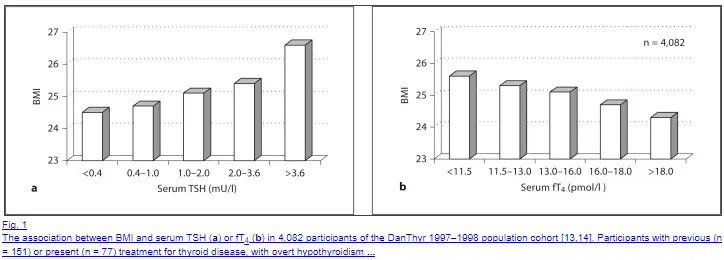
T3 is a potent stimulator of mitochondrial function which helps to control how many calories you burn at rest.
As thyroid hormone drops, your body burns fewer calories each day.
This results in a steady and slow weight gain over time.
In addition, weight gain caused by hypothyroidism is also much more difficult to lose.
This problem is further complicated by the fact that weight gain has actually been shown to reduce thyroid hormones and make the problem worse (14).
This sets the stage for a vicious cycle in which low thyroid causes weight gain and weight gain causes low thyroid.
This cycle can be broken by assessing both the weight gain AND the thyroid status in the body.
#3. Hair Loss or Changes to your Hair, Skin or Nails
Low thyroid hormone has been known to “steal” your beauty.
It has long been recognized that the quality and texture of your hair, skin, and nails may reveal a lot about your underlying health.
In fact, studies have shown that when your body is in great health, your hair, skin, and nails tend to have a “glow” about them (15) (the words of the study, not mine!).
We can, therefore, use these outward factors as a measure of what is happening on the inside of our body.
If your hair is damaged, falling out, or changing then it may be reflective of an INTERNAL problem in your body.

This can be used as a general rule but it also applies to those with thyroid problems.
Why?
Because your thyroid is involved in the regulation, production, and management of your hair, skin, and nails (16).
Small changes to your thyroid have been known to cause any or all of the following issues:
- Overt hair loss
- Thinning hair
- Hair damage
- Brittle nails
- Nail breakage
- Dry skin (17)
- Rashes or dermatitis
Note: while your thyroid can cause these problems directly, low thyroid function can also lead to nutrient deficiencies that may exacerbate problems related to your hair, skin, and nails.
If you are suffering from acne or skin changes and you think your hormones may be a problem I would encourage you to read this post.
Remember:
You should consider issues that appear on your skin as a problem that is occurring on the INSIDE of your body.
Treating skin conditions may require the replacement of thyroid hormone plus the replacement of nutrient deficiencies.
#4. Mood Changes (Including Depression, Brain Fog, Anxiety, or Irritability)
There is a strong and clear association between thyroid function and depressive-like symptoms (18).
What’s important to understand here is that depression may result from only SLIGHT and SMALL changes to thyroid function.
In fact, studies have shown that the following changes have all been associated with depressive symptoms: elevated T4 levels, low T3 levels, elevated Reverse T3 (rT3), a blunted TSH response to TRH, positive antithyroid antibodies, and elevated CSF TRH concentrations.
We also know that taking thyroid hormone tends to ameliorate (reduce) the symptoms of depression very rapidly.
I bring this up to discuss a couple of important points…
First:
We know that one of the main symptoms of hypothyroidism is depression.
We also know that small and subtle changes to thyroid hormone concentrations in the blood cause this symptom and are reversed when treated with thyroid hormone.
The problem here is that Doctors accept that depression is caused by hypothyroidism but they don’t necessarily accept that weight gain is caused by the same problem.
Second:
The connection between serum T4 levels and depression is not as strong as T3 and reverse T3 (19).
People with low T3 (otherwise known as low T3 syndrome) or high levels of reverse T3 (otherwise known as thyroid resistance) show a more consistent connection with depressive symptoms.
This means you may want to put more weight on your total T3, free T3, and reverse T3 levels when evaluating your thyroid hormone if you suffer from depression.
Third:
Treating with T3 thyroid medication (medications like Cytomel or NDT) appears to be more efficacious than treating with T4 thyroid hormone medications (20) (medications like levothyroxine or Synthroid).
In addition, other psychiatric conditions such as bipolar disorder have been shown to be reduced with the treatment of temporarily high doses of T3-only thyroid medications.
#5. Reduced Energy or Fatigue
Patients with hypothyroid or low thyroid function frequently experience low energy or fatigue.
While this symptom is very non-specific (meaning that multiple conditions can cause fatigue) it is one of the hallmark symptoms of hypothyroidism.
In addition, women tend to experience fatigue more so than men who have thyroid issues.
Fatigue is the consequence of decreased energy production at the cellular level.
Thyroid hormone, T3 specifically, has a direct action on mitochondrial function in your body (21).
Your mitochondria produce a molecule known as ATP which acts as the energy currency in your body.
Your cells are constantly producing ATP and high levels are required for every function in your body – muscle contraction, cellular function, enzyme production, etc.
Low levels of thyroid hormone may slightly reduce the production of ATP in the mitochondria resulting in a decrease in energy production.
This reduction in energy is felt as a symptom of fatigue.
This problem can be improved by taking thyroid hormone and “amping” up ATP production in your mitochondria.
#6. Constipation
Women with hypothyroidism also tend to suffer from gastrointestinal issues (22) when they have low thyroid hormones.
Thyroid hormone helps regulate bowel movements by increasing peristalsis in the GI tract (23).
Your intestines are constantly moving at a slow rhythmic pace and this is known as peristalsis.
The speed at which they move is regulated by your parasympathetic nervous system via the vagus nerve and by thyroid hormone (which speeds it up).
Low thyroid states slow down intestinal movement and increase the transit time of your bowel movements.
Normally you should have 1 bowel movement every 24 hours.
Some hypothyroid patients may have a bowel movement every 3-5 days which can be very detrimental to their overall health.
Constipation results in the retention of waste products, and the retention of potentially harmful and pathogenic bacteria and may cause intestinal distress and negative symptoms.
Often constipation is a consequence of hypothyroidism but other conditions can potentiate or make it worse.
For instance:
Hypothyroid patients tend to have a condition known as SIBO (24) which alters intestinal flora and may contribute to constipation.
#7. Muscular Pain
Muscular pain is a common symptom of hypothyroidism but many patients don’t necessarily realize that this symptom is related to their thyroid (25).
Muscular pain can be caused by various conditions such as tension, trauma, or muscle damage.
All of these conditions can be caused by low thyroid hormone and here’s why:
We’ve already discussed how thyroid hormone helps produce energy in your body, and this is also true in skeletal muscle (your muscles).
What you may not realize is that your body needs ATP in the form of energy to RELAX your muscle tissues.
Naturally, your body is able to produce a muscular contraction without ATP but it needs ATP to release the contraction.
This is why people “stiffen” up after they pass away and it is known as rigor mortis.
This is relevant to our discussion because it is possible (and occurs frequently) that small portions of your muscles contract but fail to relax.
This creates “tender spots” deep inside your muscle tissues that are extraordinarily painful when touched.
These spots are known as trigger points or pressure points.
They are potentiated by low thyroid states because some skeletal muscle tissues are unable to produce the energy necessary to completely relax.
This may result in muscular pain, chronic pain, or muscular tenderness.
In some cases treating the body with thyroid hormone can alleviate these symptoms rapidly.
In many cases, you will need to get therapeutic massages or trigger point injections to help alleviate the pain (in addition to thyroid hormone replacement).
#8. Low Body Temperature & Slow Heart Rate (Cold Hands/Feet)
Lastly, women with hypothyroidism tend to present with lower-than-normal resting heart rates and lower-than-normal body temperatures.
Do you wear socks to bed at night?
Are you always in a sweater, even in the summer?
Do you wear gloves because your hands freeze?
Do you find yourself incredibly irritable when you are cold?
All of these symptoms may be a sign that you have insufficient thyroid hormone in your body and they are well-documented symptoms of hypothyroidism.
These symptoms tend to occur as a direct result of decreased energy production and therefore decreased heat production in your body (26).
When your metabolism is normal, your body burns calories while you are thinking/reading/sleeping, etc.
When you burn calories the energy to burn these calories is released as heat.
This heat sets your body temperature and can be a reflection of your metabolism.
Low circulating thyroid hormone may impair this process and cause a lower-than-normal body temperature.
Luckily, replacement with thyroid hormone tends to ameliorate this negative effect.
What to do Next:
If you find that you associate with or are experiencing many of the symptoms listed above what should you do next?
I’ve put together this 3 step guide to help get you started.
Please note that this is just a simple starter guide, it’s not intended to be a comprehensive guide that will work for everyone.
Properly treating and evaluating your thyroid will be different for each person as each of you is unique.
Step #1. Get Properly Tested
The first and most important step when evaluating your thyroid is to get a proper evaluation.
You can get all of the necessary lab tests through your blood and serum.
What you need to understand here is that there is a difference between the lab tests that I recommend and the lab tests that your Doctor is probably used to ordering.
Most Doctors will only order the following tests:
- TSH
- Free T4
This does NOT represent a complete thyroid panel and in order to properly evaluate your thyroid, you will need to get much more than these tests.
Complete thyroid lab panel:
- TSH
- Free T3
- Free T4
- Total T3
- Reverse T3
- Thyroid antibodies
Occasionally you can find physicians who are willing to work with you, order the right tests, and change up your current medication.
If you find that your Doctor is not willing to do any of these things you may need to move to the next step:
Step #2. Find a Doctor Willing to Work with You
You can ask your Doctor to order these tests but you need to realize that interpretation is an important step in diagnosis and management.
Most physicians don’t feel comfortable ordering these tests (some may outright refuse) because they were not trained in how to read them.
If that happens to you, you can still get the tests done but you may need to seek help from more integrative physicians to get the right changes to your thyroid medication.
You can find physicians who prescribe alternative medications by contacting local pharmacies and asking for a list of names of physicians who prescribe the following medications:
- Cytomel
- Sustained release T3
- WP Thyroid
- Armour thyroid
- Nature-throid
- Compounded T4 + T3 formulations
Alternatively, you might be able to find local physicians who can help you by searching for other blogs or articles.
Please note that it may be difficult to find Doctors like the ones I am referring to, and it may take some time and patience on your part but I’ve created a free resource to help with the process which you can access here.
Step #3. Take Targeted Supplements
Lastly, you can take certain steps to help naturally improve your thyroid function.
Taking targeted supplements can help work in tandem with changes to your thyroid medication (if necessary) and can be used on their own as well.
Most hypothyroid do tend to benefit from using high-quality nutritional supplements as an adjunct therapy to their existing treatments.
The reason is simple:
Low thyroid states promote nutrient deficiencies by altering nutrient absorption and stomach acid production.
Because of this, it’s not uncommon for hypothyroid patients to be low on basic nutrients such as iron or B12.
Third: Address Basic Nutrient Deficiencies
Your first step should be to address basic nutrient deficiencies.
You can do this by taking a high-quality multivitamin or by assessing each individual nutrient deficiency through lab and serum testing.
I’ve written extensively on the most common nutrient deficiencies and how to replace them in this post.
Second: Address Thyroid Conversion
The next step that you can take is to increase thyroid conversion in your body.
In order for thyroid hormone to be active, you must convert the inactive thyroid metabolite T4 to the active thyroid metabolite T3.
This process requires certain nutrients and it can be augmented by certain supplements.
A general lack of peripheral conversion may be the reason why some patients experience hypothyroid symptoms despite taking T4-only medications like levothyroxine and Synthroid.
You can find more information on supplements that boost T4 to T3 conversion here.
First: Address Gut Health
Lastly, you will want to spend some time improving your intestinal function.
Hypothyroidism is often the result of unwanted GI conditions such as SIBO, constipation, or IBS.
You can do a lot to improve your health by taking supplements designed to increase the population of good bacteria in your gut.
I recommend starting off with a high-quality probiotic like this one.
Back to you
Bottom line?
Many women suffer from hypothyroidism throughout the world and with the current treatment paradigm, it is important that you understand the basics of diagnosis and management.
You can match your symptoms to the list provided in the post and then take the proper steps necessary to take your health into your own hands to start feeling better.
Remember:
There is hope for feeling better and feeling more like your old self, but it may take some work on your part!
Now I want to hear from you:
Are you suffering from the symptoms of hypothyroidism?
Has anything worked to help reduce your symptoms?
Do you suspect you have hypothyroidism but have difficulty getting a proper diagnosis?
Leave your comment below!
Scientific References
#1. https://www.ncbi.nlm.nih.gov/pmc/articles/PMC3712376/
#2. https://www.ncbi.nlm.nih.gov/pubmed/12919165
#3. https://www.ncbi.nlm.nih.gov/pmc/articles/PMC4743370/
#4. https://www.ncbi.nlm.nih.gov/pmc/articles/PMC3821486/
#5. https://www.ncbi.nlm.nih.gov/pmc/articles/PMC4451242/
#6. https://www.ncbi.nlm.nih.gov/pmc/articles/PMC4017747/
#7. https://www.ncbi.nlm.nih.gov/pmc/articles/PMC3267517/
#8. http://raypeat.com/articles/articles/thyroid.shtml
#9. https://www.ncbi.nlm.nih.gov/pubmed/27700539
#10. https://www.ncbi.nlm.nih.gov/pubmed/26904478
#11. https://www.ncbi.nlm.nih.gov/pubmed/9846161
#12. https://www.ncbi.nlm.nih.gov/pmc/articles/PMC3136077/
#13. https://www.ncbi.nlm.nih.gov/pmc/articles/PMC3821486/
#14. https://www.ncbi.nlm.nih.gov/pmc/articles/PMC4911848/
#15. https://www.ncbi.nlm.nih.gov/pmc/articles/PMC4354898/
#16. https://www.ncbi.nlm.nih.gov/pubmed/10792210
#17. https://www.ncbi.nlm.nih.gov/pmc/articles/PMC3219173/
#18. https://www.ncbi.nlm.nih.gov/pubmed/7230383
#19. https://www.ncbi.nlm.nih.gov/pmc/articles/PMC3246784/
#20. https://www.ncbi.nlm.nih.gov/pmc/articles/PMC3968440/
#21. https://www.ncbi.nlm.nih.gov/pubmed/12418548
#22. https://www.ncbi.nlm.nih.gov/pmc/articles/PMC4985619/
#23. https://www.ncbi.nlm.nih.gov/pubmed/15788986
#24. https://www.ncbi.nlm.nih.gov/pmc/articles/PMC4056127/
#25. https://www.ncbi.nlm.nih.gov/pubmed/24435355
#26. https://www.ncbi.nlm.nih.gov/pubmed/596246
